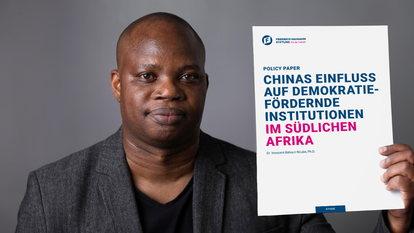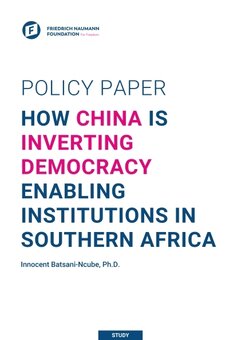Policy Paper
China's expansion in southern Africa: democracies in danger

China is expanding its influence globally. A well-known means is the Belt and Road Initiative, primarily known for its infrastructure projects. Southern Africa is also a target of this influence and investment. In the region, China inverts parliaments and political parties as essential components of political systems to exert influence and solidify China-friendly policies. Find out exactly how they do it in our Policy Paper.
China is expanding its influence globally. A well-known means is the Belt and Road Initiative, primarily known for its infrastructure projects. Southern Africa is also a target of this influence and investment. China's "no questions asked" policy and the associated non-interference in political decisions were attractive to many countries. China has now changed and expanded this policy in Southern Africa. It is making concrete efforts to invert democracy-enabling institutions and thus influence the China policy of the respective government.
Between 2000 and 2020, Chinese donors granted loans worth 160 billion US dollars to African countries. China's dependence on (primary) raw materials, especially energy, from Africa is considerable. The number of economically active Chinese companies on the continent is steadily increasing, as is the number of Chinese citizens. This raises questions about the security of its citizens and Chinese investments. These became evident to China particularly during the outbreak of the Libyan civil war, when it had to evacuate several thousand of its citizens. Political instability as well as nationalization discussions in important commodity countries such as Angola, Nigeria, Chad and Sudan could significantly hinder China's interests on the continent. Its behavior has therefore changed in recent years.
Instead of the previously assumed policy of non-interference, Dr. Innocent Batsani-Ncube, the author of the study "How China is inverting democracy enabling institutions in Southern Africa", observes that China is pursuing a two-pronged strategy to gain influence in political parties and parliaments. Political parties and parliaments are crucial elements of democratic political systems. Parties nominate candidates who are elected to public office through elections, while parliaments enact laws and control the government. China primarily supports traditional parties that have emerged from independence movements. These are still the ruling parties in many southern African countries. However, it also seeks intensive ad hoc cooperation with new parties when there is a political change. In this way, China has also managed to work constructively with parties that were elected among others on the basis of their anti-China policies. To further strengthen party cooperation, China opened the Mwalimu Julius Nyerere Leadership School in Kibaha in 2022. Young talents from some South African parties are invited to attend.
The second method of exerting influence is the construction of parliament buildings. Because construction is done by Chinese companies and only they are allowed to carry out repair work means that China secures itself constant access to the legislature and therefore to influential political elites in African countries. This naturally raises the question of the extent to which China influences these democracy-promoting institutions according to its authoritarian model.
The author concludes that China has become a key player in shaping political institutions in Africa. To counter this and support inclusive political structures, the policy paper identifies three recommendations:
- First, more in-depth research is needed on China's political influence in the region.
- China should also be integrated into existing programs to strengthen parliaments. Since a complete exclusion and elimination of Chinese influence in parliaments is not possible in the short term, China should be strategically integrated in order to make China's influence in legislative institutions more controllable.
- Finally, resilient democratic institutions must be promoted as a counterbalance to China's authoritarian influence.

Dr. Innocent Batsani-Ncube mit der Studie zu Chinas wachsenden Einfluss im südlichen Afrika
Zwischen 2000 und 2020 haben chinesische Geldgeber Kredite in Höhe von 160 Milliarden US-Dollar an afrikanische Staaten vergeben. Chinas Abhängigkeit von (primär-) Rohstoffen, vor allem Energie, aus Afrika ist erheblich. Die Zahl wirtschaftlich aktiver chinesischer Unternehmen auf dem Kontinent steigt stetig und damit auch die der chinesischen Staatsbürger. Es stellen sich also Fragen nach der Sicherheit der eigenen Bürgerinnen und Bürger und chinesischer Investitionen. Diese sind China besonders bei Ausbruch des libyschen Bürgerkriegs vor Augen geführt worden, als es mehrere tausende seiner Bürgerinnen und Bürger evakuieren musste. Politische Instabilität aber auch Verstaatlichungsdiskurse in wichtigen Rohstoffländern wie Angola, Nigeria, Tschad und im Sudan, könnten Chinas Interessen auf dem Kontinent erheblich im Weg stehen. Sein Verhalten hat sich in den letzten Jahren deshalb verändert.
Statt der bisher angenommenen Politik der Nicht-Einmischung, beobachtet Dr. Innocent Batsani-Ncube, der Autor der Studie „Chinas Einfluss auf Demokratie-Fördernde Institutionen im Südlichen Afrika“, dass China eine zweigleisige Strategie verfolgt um, in Parteien und Parlamenten an Einfluss zu gewinnen. Politische Parteien und Parlamente sind entscheidende Elemente demokratischer politischer Systeme.
Parteien stellen Kandidaten auf, die durch Wahlen in öffentliche Ämter gewählt werden, während Parlamente Gesetze erlassen und die Regierung kontrollieren. China unterstützt in erster Linie traditionelle Parteien, die aus Unabhängigkeitsbewegungen hervorgegangen sind. Diese stellen in vielen Ländern des südlichen Afrikas noch immer die Regierungsparteien. Aber es bemüht sich auch um intensive ad-hoc Zusammenarbeit mit neuen Parteien, wenn es zu einem politischen Wechsel kommt. So hat China es geschafft auch mit Parteien, die mit einer China-feindlichen Politik gewählt wurden, konstruktiv zusammenzuarbeiten. Um die Parteienzusammenarbeit noch weiter zu stärken, hat China 2022 die Mwalimu Julius Nyerere Leadership School in Kibaha eröffnet. Dort werden Nachwuchstalente einiger südafrikanischer Parteien eingeladen.
Die zweite Methode der Einflussnahme, ist der Bau von Parlamentsgebäuden. Dadurch, dass dieser von chinesischen Firmen durchgeführt wird und nur diese Reparaturmaßnahmen durchführen dürfen, sichert sich China einen stetigen Zugang zu der Legislativen und damit zu einflussreichen politischen Eliten in afrikanischen Ländern. Dabei stellt sich natürlich die Frage, inwieweit China diese demokratiefördernden Institutionen nach seinem autoritären Vorbild beeinflusst.
Der Autor stellt fest, dass China zu einem entscheidenden Akteur bei der Gestaltung politischer Institutionen in Afrika geworden ist. Um dem entgegen zu stehen und inklusive politische Strukturen zu unterstützen, identifiziert das Policy Paper drei Empfehlungen:
- Zunächst bedarf es vertiefter Forschung zur politischen Einflussnahme Chinas in der Region.
- Auch sollte China in bestehende Programme zur Stärkung der Parlamente eingebunden werden. Da ein völliger Ausschluss und eine Beseitigung des chinesischen Einflusses in den Parlamenten kurzfristig nicht möglich sind, sollte China strategisch eingebunden werden, um Chinas Einfluss in den gesetzgebenden Institutionen kontrollierbarer zu machen.
- Zuletzt müssen widerstandsfähige demokratische Institutionen als Gegenpol zu Chinas autoritärem Einfluss gefördert werden.

